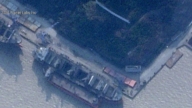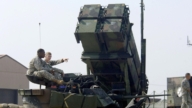【新唐人2014年03月20日訊】馬航MH370客機失聯已進入第12天,機上239名乘客和機組員仍生死未卜,其中153名中國籍乘客的部分家屬,18號,在北京與馬航管理人員見面時,表達了憤怒的情緒,他們要求馬來西亞當局提供更為準確的信息,否則將舉行絕食抗議。不過,同一天,中共駐馬來西亞大使黃惠康在新聞發佈會上表示,客機失聯事件調查中,有很多信息涉及刑事調查,不宜對外公開。
8號凌晨發生馬航客機失聯事件後,馬國政府發佈的消息極為混亂,今天的報導打倒昨天的報導,下午的報導又可能推翻上午的報導。直到15號,首相納吉布才召開記者會,證實失聯客機的通訊與追蹤系統遭人刻意關閉,飛機也轉向朝西飛行,失聯後可能還續飛7個小時,並且可能朝北方航空走廊飛往中亞,或朝南方走廊飛往印度洋。
納吉布拒絕用「劫機」來形容失聯客機狀況,宣佈調查將聚焦於人為因素,同時結束南海的搜尋任務。原來,超過10國出動以百計算的船艦、飛機作海空搜索,可能根本就找錯地方,白忙了一場。
17號,中共國務院總理李克強與納吉布通了電話,要求馬方提供更詳細準確的訊息。不過,同一天,馬國政府在新聞發佈會上表示,目前仍有相關信息沒有透露,理由是為了維護國家安全。
美國《華盛頓郵報》報導,北京已要求馬來西亞加大力度尋找失蹤的馬航客機。儘管派出9艘船協助搜尋,但對於這個小很多的東南亞鄰國,中共似乎缺少籌碼。
報導說,中共每年從鄰國購買數百億美元的原材料和零部件,儘管存在這種合作誘因,但從越南到澳大利亞等國,他們對中共的野心仍感到不安,這制約了北京的影響力。
時事評論員藍述:「中國的經濟雖然在過去幾十年有一些發展,但基本上可以看出它和周邊國家的交往仍然是以維持中共的統治為核心的,這也就是為甚麼中國經濟發展了之後,周邊的國家越來越感到不安。亞太地區這些國家對北京沒有足夠的信任感,這是北京說話影響力很低的一個最主要的原因。」
美國中文媒體《中國事務》總編輯伍凡:「馬來西亞政府為了他們自己的利益,把消息封鎖了,我想可能牽涉到他最後索賠的問題,如果僅僅是一個空難,那你有索賠,如果劫機,那是一個刑事問題,就沒有索賠了,所以他一直在放不同的空氣,製造混亂,讓你消耗精力。所以現在中國的抗議沒有用啊!」
事實上,馬航事件發生後,中共中宣部就下令大陸媒體使用《新華社》通稿,不得擅自對事件進行分析評論,也不得採訪機上乘客的家屬,還要求媒體擴大對中共全國政協、人大「兩會」的報導。
藍述:「北京覺得這是馬航的責任,它沒有想到會影響中共的穩定,所以它對這個事情就不太重視。相反的,釣魚島雖然是無人島,但是它可以炒作愛國情緒,轉移國內矛盾的視線,對它的穩定有好處。周邊那些國家也非常清楚中共這種辦事情的方式,它知道中共外表上做關心乘客這些事情也就是做做樣子,實際上中共並沒有真正的關注這件事情,這也是其他國家對北京的壓力不太重視的另外一方面的原因。」
網友痛批說,中國的媒體無一不在吃別人嚼過的饃,沒有一條原始消息發佈。倒是日本《共同社》、美國媒體、英國《路透社》成了主要的權威消息來源,這不能不說是一個諷刺。——全中國人民都準備接機,他們在忙著打擊所謂謠言!他們在圍觀家屬們的悲痛欲絕!這裡是中國!
採訪/陳漢 編輯/陳潔 後製/舒燦
Will China’s Pressure On Malaysia Be Effective?
Malaysian Airlines flight MH370, with 239 people aboard,
has been missing for 12 days.
On March 18, relatives of 153 Chinese passengers expressed
their anger when they met with authorities
from Beijing and Malaysia.
The relatives requested that Malaysia provide more accurate
information, otherwise they will stage a hunger strike.
On the same day, China’s ambassador to Malaysia said
in a press conference that the missing plane incident
is under investigation, and many details involving
the criminal investigation cannot be publicized.
The aircraft went missing on March 8.
The Malaysian government’s news releases became chaotic,
with new news releases contradicting prior releases.
The news released in the afternoon ran contrary
to the morning’s report.
On March 15, Malaysian Prime Minster Najib Razak said
in a press conference that the missing plane’s signal
and tracing system were deliberately turned off,
and the plane changed course and headed to the west.
It was likely that the plane was airborne for seven hours
after having gone missing, and it flew to central Asia
or went down in the southern Indian Ocean.
Despite speculation regarding a hijacking, Razak said that
the investigation will focus on the “deliberate" action.
Meanwhile, the South Sea search will conclude.
More than 10 countries have provided hundreds
of ships and aircraft to search the sea,
but may have been searching the wrong area.
On March 17, China Premier Li Keqiang
held a telephone conference with Razak.
Li requested that Malaysia provide
more accurate information.
On the same day, the Malaysian government announced
in a press conference that some relevant information hasn’t been released for national security reasons.
The Washington Post reported that Beijing has requested
Malaysia to ramp up the search effort.
“Despite sending nine ships to help in the search, China
appears to have little leverage over
its far smaller southeast neighbor."
The report states that as “incentives for cooperation"…
“China buys “tens of billions of dollars’ worth
of raw materials and components from them annually."
“Countries from Vietnam to Australia are uneasy
about China’s ambitions, which has hampered its efforts
to acquire influence."
Lan Shu, current affairs commentator: “Although China has
had some economic development over the last few decades,
in cooperating with its neighbors it’s still focusing
on its Communist rule.
That’s why the neighboring countries feel
more and more uneasy after China’s development.
Asian Pacific countries don’t have enough confidence
in Beijing.
This is the main reason why Beijing has poor influence."
Wu Fan, US-based expert in China affairs: “The Malaysian
government covers up the information for its own interests.
I think it’s likely linked to final compensation issues.
If it is a crash tragedy, compensation claims
would be involved;
If it is a hijacking, which is a criminal matter,
compensation is not applicable.
Thus Malaysia changes its story all the time,
creating confusion and consuming people’s energy.
Nonetheless, China’s protest did not work."
In fact, following the plane’s disappearance,
the Communist Party Propaganda Department issued a notice
ordering all media coverage to toe Xinhua News Agency’s
line.
Independent analysis or commentary is forbidden.
The media is not allowed to interview passengers’
family members,
and must strengthen its coverage
of the Communist Party’s congress."
Lan Shu: “Beijing suggests that
it is Malaysia Airlines’ responsibility.
Because the Chinese Communist Party (CCP) doesn’t think
the incident will affect it’s stability, thus it doesn’t concern
itself much.
The Diaoyu Islands are uninhabited islands, but the CCP
hypes the nation’s patriotic sentiment in order to divert
domestic conflicts, which the CCP believes is good
for its stability.
China’s neighboring countries clearly
know the CCP’s way of handling things.
They know that the CCP’s concern for its passengers
is just a facade.
Actually, the CCP does not really care about its people.
This is another reason that the other countries didn’t take
too much pressure from Beijing."
A netizen who uses the screen name “live broadcasting"
condemned China’s media for basing reports
on other media reports, and is concerned that
no original news information has been issued.
However, Japan’s Kyodo News, U.S. media and the UK’s
Reuters have become major authoritative sources.
This is satirical.
All Chinese people are waiting for the passengers’ arrival.
On the contrary, the CCP is engaging in attacking
the so-called “rumors".
The CCP is careless even as they watch
the sorrowful relatives of passengers.
This is Communist China!
Interview/Chen Han Edit/Chen Jie Post-Production/Shu Can




























